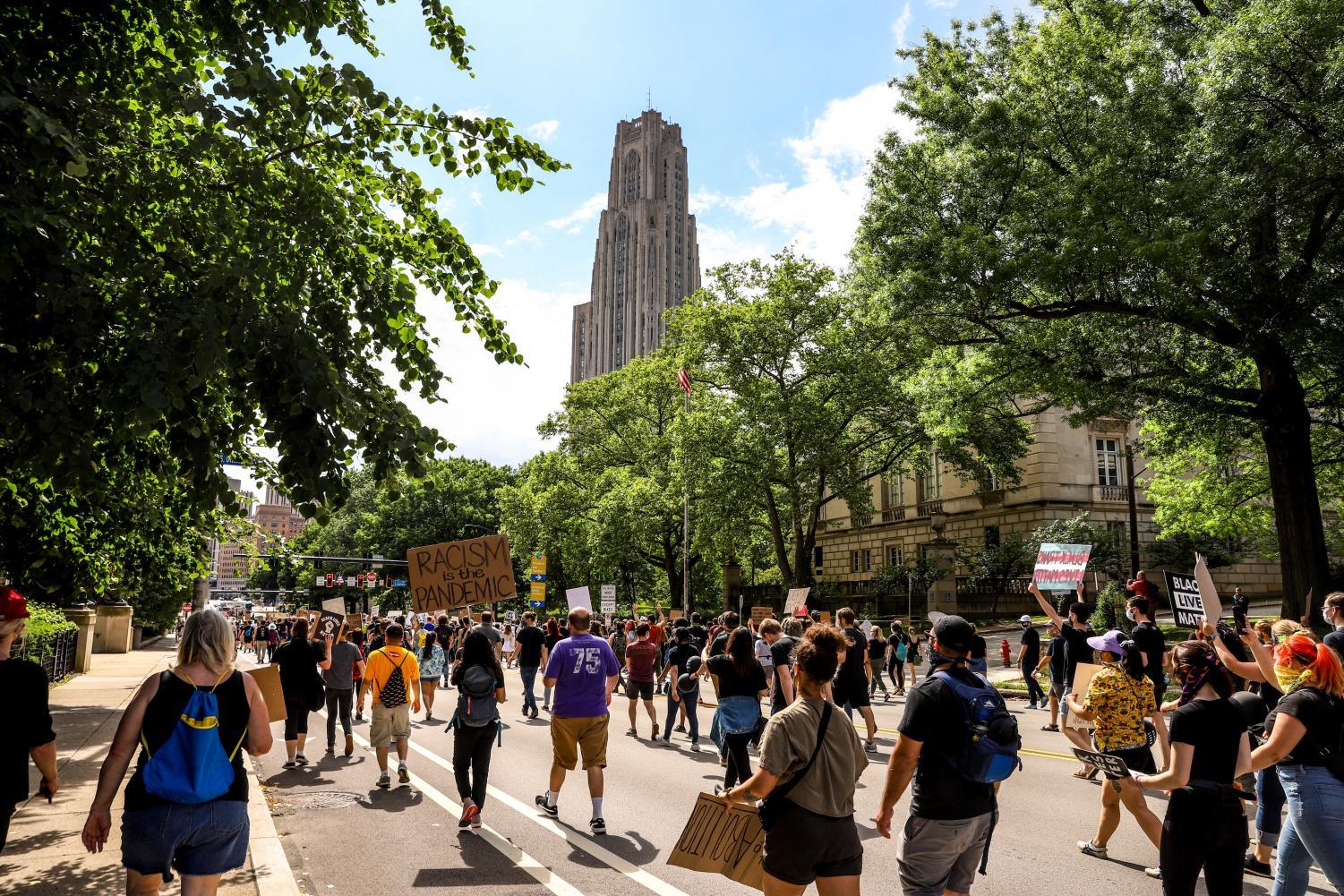Op-Ed | Pitt Anthropology grad students, alumni stand with Black Lives Matter


Protesters march down Forbes Avenue, in the shadow of the Cathedral of Learning, at a Saturday protest.
Editor’s note: This op-ed reflects the views of a large group of graduate students and alumni of the Department of Anthropology involved in its drafting, not just the signed co-authors.
We, graduate students and graduate alumni of Pitt’s Department of Anthropology, recognize and fully support the movement to protect Black lives from state violence. The latest killings of George Floyd, Manuel Ellis, Tony McDade and Breonna Taylor by police officers have reignited a national movement that demands profound changes to the treatment of Black people and other racial minorities.
These recent killings are the tip of the iceberg within a continuum of violence that includes, but is not limited to, police brutality. This continuum of violence includes white supremacist vigilantism as evident in the killing of Ahmaud Arbery, white fragility that weaponizes its privilege as seen in the interaction between Amy Cooper and bird-watcher Christian Cooper in Central Park and microaggressions and tokenisms that continue to be perpetuated and overlooked in university settings. The settler-colonial history of this country that continues to shape racial hierarchies must be confronted critically in order to create a truly equitable society. We cannot and will not stay silent.
Although Pittsburgh is often described as one of the “most livable” cities in the United States, the truth is that it is also one of the most segregated. Recent and historic waves of gentrification throughout Pittsburgh have disproportionately displaced Black residents from many communities. Despite the fact that the City has one of the most sophisticated medical systems in the country, the Black community of Pittsburgh still faces severe health disparities, including higher mortality rates during pregnancy and higher instances of chronic disease. At the same time, the police budget has been increased by almost $38 million dollars since 2015, an increase of nearly 50%. The City’s 2020 police budget is $114,787,000, almost one-fifth of the overall City budget. Police brutality is not a distant reality for the Pittsburgh area, either: Michael Rosfeld, a former Pitt police officer who was then working for nearby East Pittsburgh, shot and killed unarmed 17-year-old Antwon Rose II. Rosfeld was acquitted in 2019.
Pitt is also not exempt from critique. A 2016 protest against student debt was met with violent response by campus police. The protest was not tied to race relations, but the excessive response from Pitt police reflected a typical pattern of police behavior nationwide. Most of the time, similar responses disproportionately target Black people.
More broadly, the University has not done enough to improve racial inequities in its faculty and student bodies. The 2019 Racial Equity Study presented to the Senate Budget Policies Committee found that Pitt faculty were overwhelmingly white, with only 3 to 4% identifying as Black and 3 to 4% identifying as Hispanic. In terms of Pitt’s student population, Black undergraduates represent only 5.3% of the Oakland campus student body, while the percentage of Black adults aged in the traditional college bracket of 18-24 is 14.2% in the state of Pennsylvania and 14.6% nationwide. This is unacceptable.
As the new generation of anthropologists, we must critically reflect on our roles and positionalities. The legacy of our discipline and academic work has been contradictory. Anthropology was tied in the early years with the global power structure of colonialism, but many of its practitioners over the years have exposed and criticized the injustices of colonialism and racism.
Despite its noble intentions, scholarly work within anthropology has not been sufficient in dismantling white supremacy or in decolonizing the discipline. We recognize that all too often we are complicit in reinforcing problematic epistemic traditions, biased academic structures and cultures of discrimination that silence Black scholarship and labor. We must do better as educators and scholars.
As students and alumni of the Department of Anthropology, we commit to doing everything in our power to work in collaboration with Pitt anthropology faculty and staff to expand current initiatives and implement new ones that aim to address this situation. We are reassessing our roles within our own department, institution and, ultimately, within the discipline of anthropology at large. That includes expanding our purview beyond academia to support and follow Black activists in their work to eliminate police violence and mass incarceration. In order to provoke meaningful change, our next steps consist of deepening anti-racist academic work, diversifying our department and better integrating our University in the wider community.
Courtney Besaw is a fourth-year Ph.D. student in the Department of Anthropology.
Anika Jugovic Spajic is a fifth-year Ph.D. candidate in the Department of Anthropology and an organizer with the Pitt Graduate Student Organizing Committee.
Alexa Kellogg is an alumna of the Hot Metal Bridge program in the Department of Anthropology.
Ognjen Kojanic is a sixth-year Ph.D. candidate in the Department of Anthropology and an organizer with the Pitt Graduate Student Organizing Committee.
Recent Posts
Therese Pitman: Giving back to Pitt’s student-athletes with equality
Pitman is Pitt’s Director of Student Athlete Development where she helps student-athletes navigate their career…
Pitt speech and debate team heads to nationals
The William Pitt Debating Union, Pitt’s speech and debate team, sends students to both in-person…
Visuals: A Year in Review
The visuals desk had an interesting year. In the midst of the 2024 Presidential Election,…
De-stress events across campus offer students a break from studying
During finals week, departments across campus are offering wellness events to help students manage stress…
Pitt students share their summer plans
After a long and strenuous academic year, many students are excited to take a break.…
Column | Collaboration and connection make us better — yes, even in journalism
Today is the last day I will ever do this, and despite the amount of…

